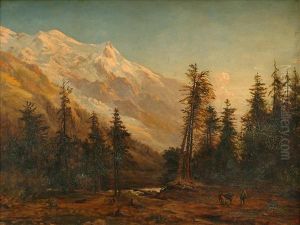Robert Porrett Collier Paintings
Robert Porrett Collier, born on June 21, 1817, in London, England, was not primarily known for his contributions to the art world but rather for his distinguished career as a British lawyer and politician. Despite the initial confusion with art history, Collier's legacy is predominantly anchored in the legal and political arenas of the 19th century. He was the son of Sir George Collier, a notable figure in his own right, which provided Robert with a privileged background that facilitated his ascent within British society.
Collier's education was thorough and classical, preparing him for a career in law. He was called to the Bar at the Inner Temple in 1843, marking the beginning of a successful legal career. His prowess as a lawyer quickly became apparent, and he garnered a reputation for his eloquent advocacy and comprehensive legal knowledge. Collier's legal career was diverse, covering a wide range of cases and establishing him as a respected figure in the legal community.
Transitioning from law to politics, Collier's influence expanded as he entered the political sphere. He was first elected to Parliament as a Liberal Member for Plymouth in 1852, a position he held until 1857, and then again from 1859 to 1865. During his political career, Collier was appointed as Attorney General for England and Wales in 1863, a role in which he served until 1866. His political and legal expertise led to his appointment as Lord Justice of Appeal in 1871, and he was subsequently raised to the peerage as Baron Monkswell, of Monkswell in the County of Devon, in 1874.
Despite his primary engagement in law and politics, Collier did have connections to the cultural and artistic movements of his time, reflective of the broader Victorian interest in arts and literature. However, his lasting impact remains within the framework of legal reforms and political service he provided to Victorian England. Robert Porrett Collier passed away on October 27, 1886, leaving behind a legacy defined by his contributions to the British legal system and parliamentary governance rather than the field of art.
